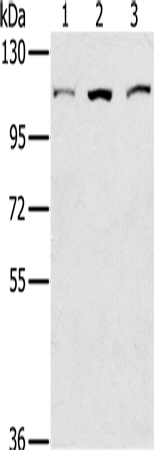KIF20A Rabbit Polyclonal Antibody
Frequently bought together (3)
beta Actin Mouse Monoclonal Antibody, Clone OTI1, Loading Control
USD 200.00
Other products for "KIF20A"
Specifications
| Product Data | |
| Applications | IHC, WB |
| Recommended Dilution | WB: 200-1000 WB positive control: K562, 293T and hela cells IHC: 50-200 Positive control: Human breast cancer Predicted cell location: Cytoplasm or Nucleus |
| Reactivities | Human, Mouse |
| Host | Rabbit |
| Isotype | IgG |
| Clonality | Polyclonal |
| Immunogen | Fusion protein of human KIF20A |
| Formulation | pH7.4 PBS, 0.05% NaN3, 40% Glyceroln |
| Concentration | lot specific |
| Purification | Antigen affinity purification |
| Conjugation | Unconjugated |
| Storage | Store at -20°C as received. |
| Stability | Stable for 12 months from date of receipt. |
| Predicted Protein Size | 100 kDa |
| Gene Name | kinesin family member 20A |
| Database Link | |
| Background | KIF20A (kinesin family member 20A), also known as Rabkinesin-6, RAB6KIFL (Rab6-interacting kinesin-like protein), GG10_2 or MKLP2 (mitotic kinesin-like protein 2), is a 890 amino acid protein that contains one kinesin-motor domain and belongs to the Kinesin-like protein family. KIF20A locates to the Golgi apparatus and interacts with guanosine triphosphate (GTP)-bound forms of RAB 6. KIF20A may be responsible for the retrograde RAB 6 regulated transport of Golgi membranes and related vesicles along microtubules. |
| Synonyms | MKLP2; RAB6KIFL |
| Reference Data | |
| Protein Families | Druggable Genome |
Documents
| Product Manuals |
| FAQs |
| SDS |
{0} Product Review(s)
0 Product Review(s)
Submit review
Be the first one to submit a review
Product Citations
*Delivery time may vary from web posted schedule. Occasional delays may occur due to unforeseen
complexities in the preparation of your product. International customers may expect an additional 1-2 weeks
in shipping.






























































































































































































































































 Germany
Germany
 Japan
Japan
 United Kingdom
United Kingdom
 China
China







